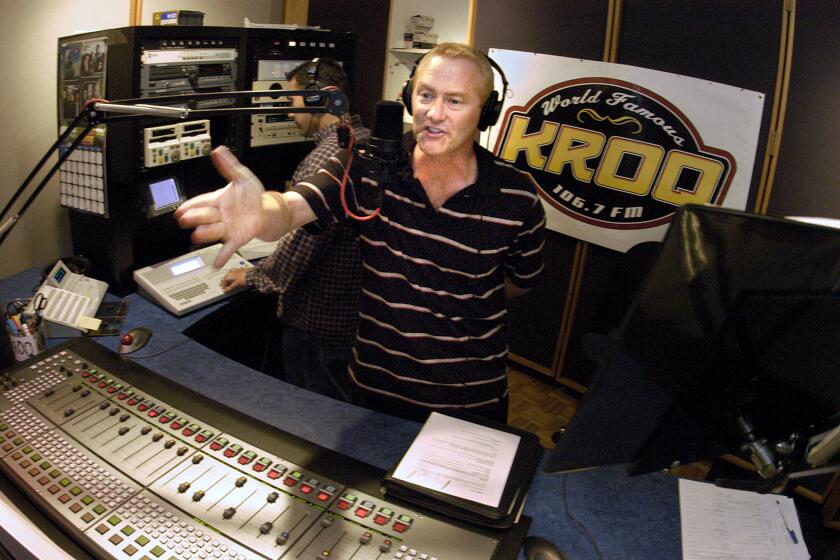‘The Upsetter’: The life and times of Lee ‘Scratch’ Perry -- VIDEO
- Share via
The image of a raging fire is a constant in the world of Lee “Scratch” Perry. Even at age 75, the Jamaican originator of the reverb-laden sounds of dub music still burns a little bit out of control. In a career spanning 40 years and counting, his enduring rude boy attitude and sometimes chaotic methods have only added to his reputation as one of the most important — if least known — creative forces in Jamaican music.
The former producer for Bob Marley and the Wailers, the Heptones, the Congos and many other seminal figures in reggae music, and collaborator with pop stars including the Clash and Paul McCartney, Perry’s enigmatic life and career are now the subject of a recently released film, “The Upsetter: The Life and Music of Lee Scratch Perry.” Seven years in the making, and three years since its debut at the 2008 South by Southwest Film Festival, filmmakers Ethan Higbee and Adam Bhala Lough are bringing the film to the Downtown Independent theater for its long-awaited theatrical release on Friday, where it will run through April 1.
For Higbee, seeing the documentary finally reach theatrical release represents years of struggle, both to make the film and to capture the spirit of Perry.
“He’s the one who really brought the worlds of Jamaican music and the Rastafarian faith together,” said Higbee, 32. “He brought a spiritual element to the music, which is what has always made reggae so amazing.”
“The Upsetter,” named after one of the wiry producer’s nicknames, was cobbled from exclusive interviews at Perry’s home in Switzerland in 2006 as well as London and the U.S. Piles of grainy footage from other sources also surface in the film — most notably clips shot days after Perry allegedly destroyed his legendary home recording studio, the Black Ark, by burning it to the ground in the late 1970s. Despite having produced hugely successful recordings for renowned artists, Perry claims that a combination of financial pressure and his wife leaving him for another musician drove him to destroy his artistic oasis and start his career again, from scratch.
Amid the highs and lows of his music career, the directors of “The Upsetter” decided to have Perry tell most of his story in his own words, with the creaks and bends of his weathered Jamaican accent.
“We had no head shot interviews, except for Lee. It’s only Lee,” Higbee said. The filmmakers decided not to use 20 interviews with other sources, in an effort to keep the film’s message streamlined through the eyes of the artist.
After the film’s 2008 festival debut, the filmmakers did make one exception: They took on Oscar-winning actor Benicio Del Toro, an avid Perry fan, to narrate the film. While recording Del Toro’s voice-overs and clearing up legal issues over the rights to use a major portion of Perry’s rare, original music and archival footage, “The Upsetter” was shelved for about three years.
“At this point, it’s been with me so long it feels like the only thing I’ve ever done,” said Higbee, who remembers arranging a pitch meeting with Perry for the first time in a Chinese restaurant in London in 2005.
Higbee had been fixated on making a film with Perry as a film student at New York University. Before their first meeting, he had spent about two years trying to get access to the reclusive, Jamaican polymath. Though Lough has directed a number of music-based documentaries, including the 2009 Lil Wayne documentary “The Carter,” it was tough to imagine cramming all of Perry’s life story into a 90-minute film.
“This wasn’t gonna be your typical story of a celebrity or a musician,” said Lough, 31. “This was a guy with a long journey. There’s a wisdom there that you just wanna soak in.”
Perry, a rural-born Jamaican and Rasta man, burst onto the scene as a producer and vocalist in 1968 sporting a brand-new sound with his single “People Funny Boy,” a bouncing island track that hashed out the stoned eighth-note beginnings of reggae. In the early ‘70s, he is said to have helped Marley hone his vocal and songwriting talents and even lived with him for a brief period while recording and producing some of the icon’s most celebrated early recordings. Perry eventually gained recognition as a solo artist and a producer for his innovative techniques and studio wizardry, achieving results through ingenuity rather than studio gadgetry, hatching some of the first ever dub mixes.
Perry has reemerged in pop culture consciousness in recent decades, with DJs cannibalizing his productions for their works, and his sporadic concerts, filled with his lively and sometimes-unintelligible stage presence. “The Upsetter” screens at various theatres throughout the country this spring.
“His career has really come full circle,” Higbee said. “He’s always been writing and recording songs, and people have said, ‘Aw, your voice, you don’t have it.’ A lot of people say he gave Bob his voice. It’s cool because now Lee’s the guy on stage. He’s come full circle.”
More to Read
The biggest entertainment stories
Get our big stories about Hollywood, film, television, music, arts, culture and more right in your inbox as soon as they publish.
You may occasionally receive promotional content from the Los Angeles Times.










